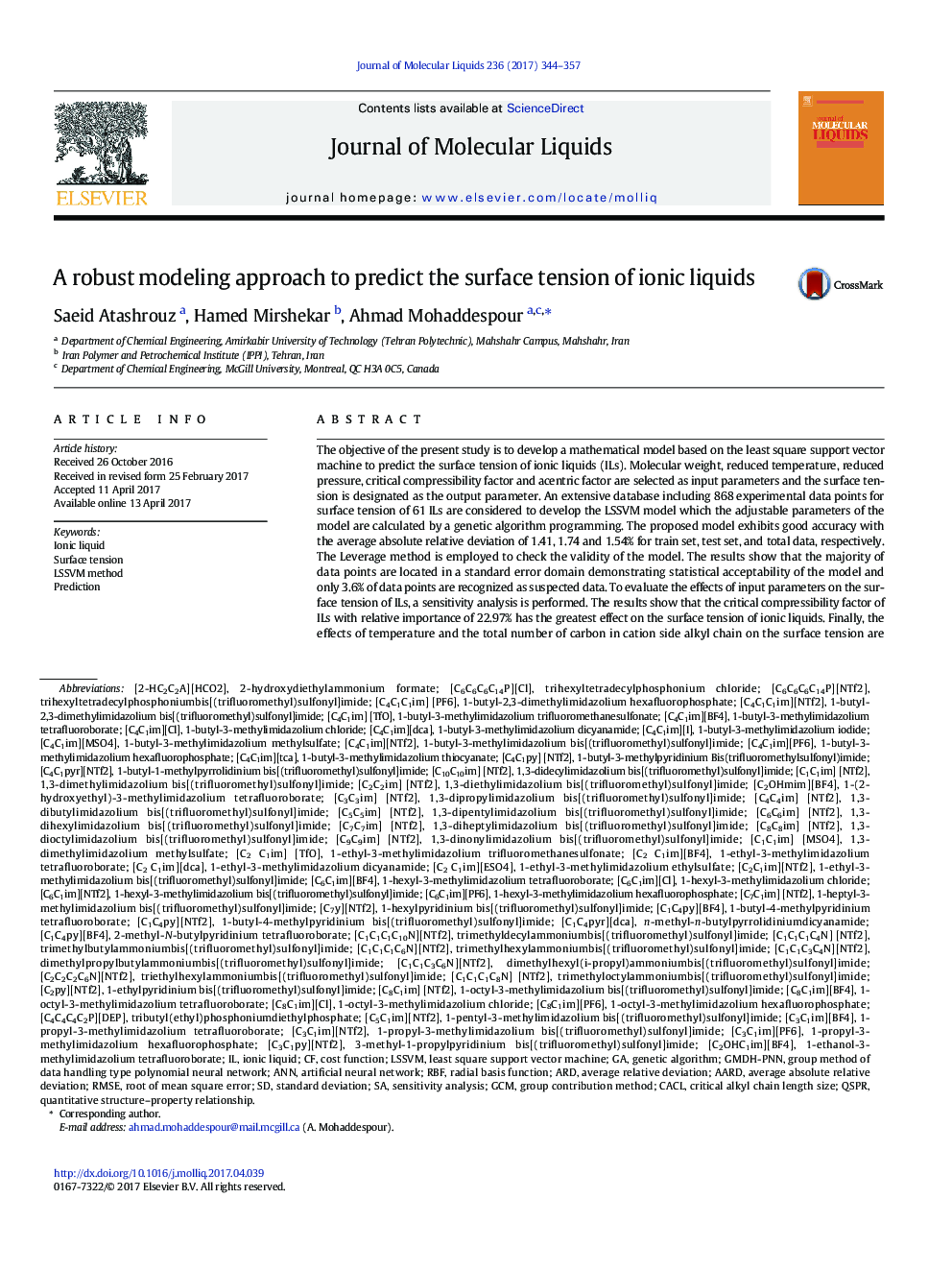| Article ID | Journal | Published Year | Pages | File Type |
|---|---|---|---|---|
| 5409097 | Journal of Molecular Liquids | 2017 | 14 Pages |
Abstract
The objective of the present study is to develop a mathematical model based on the least square support vector machine to predict the surface tension of ionic liquids (ILs). Molecular weight, reduced temperature, reduced pressure, critical compressibility factor and acentric factor are selected as input parameters and the surface tension is designated as the output parameter. An extensive database including 868 experimental data points for surface tension of 61 ILs are considered to develop the LSSVM model which the adjustable parameters of the model are calculated by a genetic algorithm programming. The proposed model exhibits good accuracy with the average absolute relative deviation of 1.41, 1.74 and 1.54% for train set, test set, and total data, respectively. The Leverage method is employed to check the validity of the model. The results show that the majority of data points are located in a standard error domain demonstrating statistical acceptability of the model and only 3.6% of data points are recognized as suspected data. To evaluate the effects of input parameters on the surface tension of ILs, a sensitivity analysis is performed. The results show that the critical compressibility factor of ILs with relative importance of 22.97% has the greatest effect on the surface tension of ionic liquids. Finally, the effects of temperature and the total number of carbon in cation side alkyl chain on the surface tension are predicted by the proposed model. The model exhibits a monotonic decrease for surface tension with increasing temperature. Moreover, it well predicts the effects of the total number of carbon atoms in cation side alkyl chain on the surface tension.
Keywords
1-Octyl-3-methylimidazolium tetrafluoroborate1-octyl-3-methylimidazolium chloride1-butyl-4-methylpyridinium tetrafluoroborate1-Butyl-3-methylimidazolium bis[(trifluoromethyl)sulfonyl]imide1-Butyl-3-methylimidazolium methylsulfate1-Hexyl-3-methylimidazolium tetrafluoroborateTrihexyltetradecylphosphonium chloride1-Ethyl-3-methylimidazolium trifluoromethanesulfonate1-Ethyl-3-methylimidazolium ethylsulfate1-Butyl-3-methylimidazolium trifluoromethanesulfonate1-Butyl-3-methylimidazolium dicyanamide1-Butyl-3-methylimidazolium thiocyanateARDGCMANN1-ethyl-3-methylimidazolium dicyanamide1-butyl-3-methylimidazolium chlorideRMSERBF1-Ethyl-3-methylimidazolium tetrafluoroborate1-Octyl-3-methylimidazolium hexafluorophosphate1-Butyl-3-methylimidazolium hexafluorophosphate1-Butyl-3-methylimidazolium tetrafluoroborate1-Hexyl-3-methylimidazolium hexafluorophosphate1-hexyl-3-methylimidazolium chlorideGenetic algorithmstandard deviationQSPRCost functionSensitivity analysisQuantitative structure–property relationshipGroup contribution methodArtificial Neural NetworkAARDRadial basis functionLSSVMIonic liquidaverage relative deviationPredictionSurface tensionLeast square support vector machine
Related Topics
Physical Sciences and Engineering
Chemistry
Physical and Theoretical Chemistry
Authors
Saeid Atashrouz, Hamed Mirshekar, Ahmad Mohaddespour,
